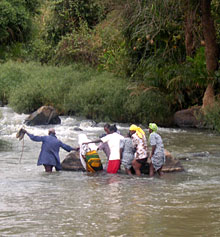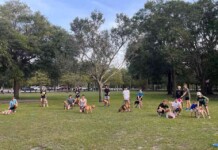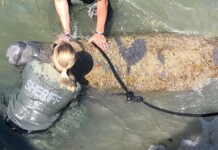 The Nithi River used to claim as many as 50 lives each year near the Kenyan villages of Kajuki and Mutino.
The Nithi River used to claim as many as 50 lives each year near the Kenyan villages of Kajuki and Mutino.
But a Rotary club project between Meru, Kenya, and Middleton/Manchester, England, helped fund a new bridge that allows villagers to cross the river safely, while transforming the economies of the communities in the process.
Before the bridge was constructed, Mutino villagers had to make a 30 mile roundtrip journey to cross the river at a safe point, making it difficult to reach Kajuki for supplies and medical services. Often in emergencies, villagers would try to ford the river, and many died as a result. (In this photo, Mutino villagers ford the Nithi River during the dry season, courtesy of John Brooker)
“Life was never the same again for these people,” says Meru club president Julius Gatobu Mwithimbu, reflecting on the results of the project. “People started traveling from far away just to come and feel the joy of walking over this river that had previously claimed the lives of their loved ones.”
During the July opening ceremony for the bridge, Mwithimbu and John Brooker, district grants subcommittee chair, stood side by side, struggling to hold back emotion as they watched a group of Kenyan women helping a pregnant friend wade across the river. The women were demonstrating what their lives had been like before the bridge’s opening.
“It hit home to me when they took the pregnant woman across how important [the bridge] is. During the rainy season, the river can rise 2 meters high or more,” says Brooker.
Humble beginnings
The idea for the project, dubbed the Elliot-Poole Bridge, came to Brooker in 2005 after he saw an episode of the BBC television program Blue Peter. The show featured a boy named Elliot Inglis, who was visiting Kenya to help out with humanitarian projects. Brooker contacted the Inglis family and learned of the need for a bridge between Mutino and Kajuki. He also contacted the newly formed Meru club to see how he and his club could help.
Mwithimbu reports that the bridge is still standing strong, even after two months of heavy rains. Twice before, the Kenyan government had attempted to build a bridge between the villages, but both structures were swept away during rainstorms.
Brooker notes that the bridge has already begun to transform the villages’ economies. Mutino residents can easily bring their farm products to the Kajuki market, and they have access to government, school, and hospital services that would otherwise be unavailable. Several entrepreneurs have even built a hotel and restaurant near the bridge.
“People were walking to the bridge, kneeling down, and praying — that’s how much it meant to them,” says Brooker.
The clubs are collaborating on another Matching Grant project in Tharaka, Kenya, where they’re building tanks to collect water runoff from rocky outcrops in the landscape. They’re also in the process of applying for a Health, Hunger and Humanity Grant to help collect water for Kenyan villagers during the dry season.
The Inglis family and several British Rotary clubs have already stepped up to raise money for the Meru and Middleton clubs’ collaborative projects.
Story source for this and other good works projects: www.rotary.org
(Thanks to my Italian friend, Managing Editor Sergio Tripi, at GoodNewsAgency.org for the story tip!)




















talk about the everday conveniences we mostly take for granted! Love the story and what it means for those people… thanks geri